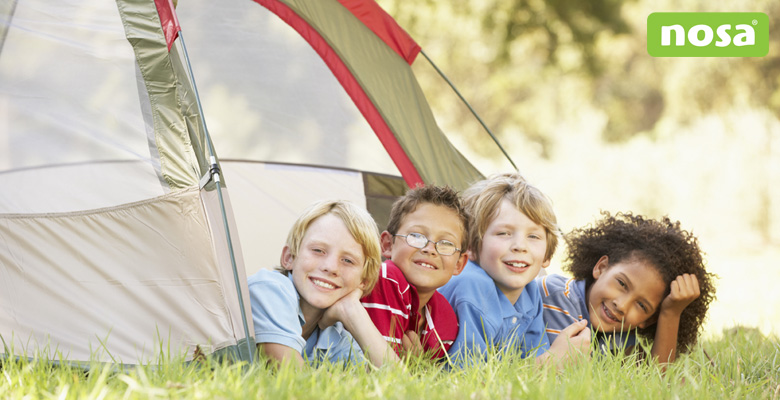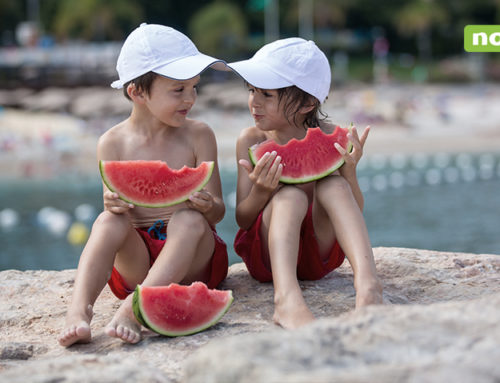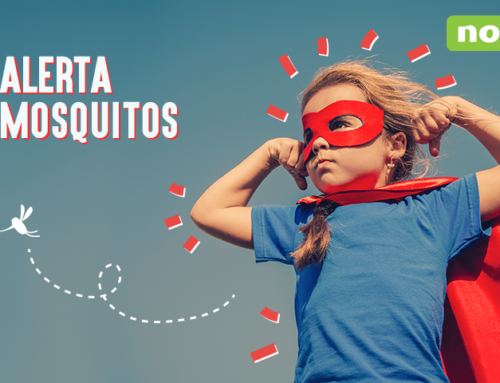As we say goodbye to winter and welcome the good weather of spring and summer, it's time for outdoor activities to be shared with family and friends. It is also the right time for a tiny threat to multiply: mosquitoes.
Their bites cause a variety of discomforts. Not to mention the fact that we have all been very nervous at times when we hear their insistent buzzing when we go to sleep or when we are doing some activity.
As cruel as it sounds, we cannot allow mosquitoes to feed on our blood.
Avoid those pesky insects and take care of yourself so you don't get bitten!
Nature created them for the joy of frogs, bats and other insectivorous animals. They have their role in the food chain, but... isn't it nice to have bites all over your body?
Fortunately, in Spain we have certain climatic conditions that prevent us from being inundated with this insect plague all year round.
However, children are quite exposed to them due to the fact that throughout the year they usually carry out activities in the middle of nature such as camps, excursions to the countryside...

At Nosa Healthcare we help you get rid of these annoying buzzers with useful and practical information.
In this article we show you how to combat them and therefore include the following:
- What are the reasons why we get bitten by mosquitoes?
- What discomfort mosquito bites can cause us
- Various recommendations on how to deal with mosquito bites
- Tips for preventing mosquito attacks
- List of natural repellents to have on hand when mosquitoes bother us
We have summarised everything you need to know to keep mosquitoes at bay and protect your children from mosquito bites.
When and why we get bitten by mosquitoes
In general, mosquitoes like warmth and humidity. However, there are several species and each has its own climate and breeding preferences. It is common that they start to proliferate when temperatures rise (spring and summer), in rainy seasons, and in areas close to stagnant fresh water. They lay their eggs in lakes, ponds, rice paddies, children's pools, abandoned toys that collect rainwater, tyres, holes in trees and even pots thrown in dumpsters and other places inside and outside the home.
The bites are usually made by female mosquitoes. They need human blood to receive nutrients that provide fertility to their eggs. The survival of their species depends on their bites, which is why they are so insistent and annoying.
Mosquito larvae cannot fly when they hatch from eggs. They remain in the water for about 4 days. Once they are ready, they come out, dry in the sun and fly away. The females go in search of blood to be able to reproduce and the cycle continues: eggs, larvae, mosquitoes, bites...
Mosquitoes tend to be most active in the evening and at dawn. The rest of the day, they rest in dark places, protected from light. Sometimes on surfaces where they can camouflage themselves or go unnoticed. Certain species (the fewest) also bite during the day.
Their body structure is designed to quickly introduce their thin proboscis through the superficial layers of the skin. They prefer areas where the epidermis is thinner and the blood supply is greater: ankles, arms and hands...
They introduce their proboscis or proboscis to suck the blood. But before doing so, they inject a substance that we could call "their saliva", which is what generates a peripheral coagulation, or welt. This inflammation, or tiny coagulation, is the immune system's response to a foreign substance. It is this that produces the characteristic itching or stinging.
If you are not allergic, your immune system is under control after a few minutes. If you are allergic to mosquito bites, on the other hand, the inflammation can become excessive.
Discomfort caused by mosquito bites
Bites from mosquitoes and other insects are a frequent cause of dermatological emergencies. We never know how our body will react to a bite. Typically, redness, hives and itching appear. However, we never know how our body will react to a bite. In very allergic people the picture of discomfort is a little more serious.
Some people at an early age have allergic reactions to mosquito bites that are much more severe than the typical hives and swelling. They may experience general malaise, breathing problems, fever, fainting, lightheadedness, etc.
Other seemingly non-allergic people develop hypersensitivity to insect stings overnight. They do not know it until the day they have an unfortunate encounter with these tiny agents and suffer the consequences.
Mosquito nuisance is not limited to allergic reactions. Mosquitoes are vectors of various diseases.
In Spain, diseases caused by mosquito bites are fairly well controlled thanks to health campaigns. However, if you go on holiday to other countries in Latin America and Asia, you should take extra care. It is advisable to find out about the measures offered by international health organisations for diseases transmitted by insect bites.
Mosquitoes can transmit with their bites:
- Dengue
- Malaria
- Chikungunya
- Nile Virus
- Heart parasites
And the dangerous thing is that it only takes one bite to spoil the moment and incubate an unwanted virus.
On the other hand, mosquito bites that we scratch are highly likely to become infected. That's another nuisance to add.
Do's and don'ts of mosquito bites
Treatments for mosquito bites vary depending on the person's reaction.
For most people it is enough to apply a little local cold for 10 minutes (ice wrapped in a piece of cloth) and the welts are reduced. We can rub some alcohol, aloe vera gel, calendula or any other anti-inflammatory substance. At Nosa Healthcare we have the After bite roll on 100% natural a very effective and at the same time very respectful formula for the most sensitive skin: ammonia-free, alcohol-free and paraben-free,
People who have very severe local allergic reactions may need corticosteroids or an oral anti-inflammatory or antihistamine. Never hesitate to consult a doctor or specialist if the discomfort of the sting is exaggerated..
The worst thing we can do when we have mosquito bites is to scratch. Fingernails store dirt that can lead to infection. Nor does it help to apply repellent to bites.These can cause even more irritation. Their function is only repellent or preventive. They do not help us once we have the welts.
Tips on how to prevent mosquito bites
To prevent mosquito bites we must create an environment free of them. Let's get rid of their water containers. Regularly empty flower pots, gutters, animal water dishes, etc.... If we do not interrupt their reproduction cycle, it is impossible to wipe them out.
Other measures to keep mosquitoes out of our environment include the use of screens or screens on windows.
In the room you must use mosquito nets and spray them with a mosquito repellent.. It is also true that mosquitoes do not like cold air. If you are in a closed room and have air conditioning, lower the temperature and mosquitoes will bother you less.
Avoid going out in nature without protection when they are most active, i.e. early in the morning, at dusk and at night.
Use mosquito nets for prams and carriers when outdoors. Especially in tropical countries where malaria and dengue fever are present. As already mentioned, mosquitoes are the vectors that transmit these diseases.
The best ally to protect ourselves from stings is the use of a mosquito repellent or natural roll on. At Nosa Healthcare we have several formats so that you can find the one that best suits your needs. children's needs and the whole family.

We can also wear long-sleeved shirts and long trousers when we are outdoors. This is not entirely safe, however, as mosquitoes can bite through thin fabrics. For added protection, we can spray mosquito repellent on our clothes..
On the other hand, mosquitoes are attracted to light. So if you are in a rural area, avoid over-lighting spaces or they will come after you.
In closed cars and vehicles, spray them with a repellent and close the doors about 20 minutes before entering. Then open them and air the car a little before use.
Repellent products to prevent mosquito and other insect bites
Mosquito repellent products can be very diverse. From eucalyptus, lemon and citronella scented candles and incense to ultrasound devices or sprays for the environment.
Among the most effective are repellents. These can be applied to skin or clothing.
At Nosa Healthcare we have developed a wide range of products to repel mosquito bites and other insect bites with different active ingredients. As we have mentioned, we have them in different formats (roll-on o sprayDo you want to know them? Well, here they are:
- The family insect repellentFormulated with IR 3535 to 20% creates a protective barrier on the skin that effectively repels mosquitoes, including the tiger mosquito, for up to 8 hours. Effectiveness tested on insects and tiger mosquitoes.
- The mosquito repellent forte: Contains IR 3535 to 30% ideal for travel to tropical areas due to its highly effective formula in extreme weather conditions. Effective against tiger mosquitoes and tropical mosquitoes that can cause Zika virus. Nosakit Forte offers up to 6 hours of protection.
- The natural roll-on: contains 100 % natural active ingredients such as Eucalyptus Citriodora and the Geraniolboth provide effective protection. Ideal for children and adults.
We hope our post has been useful to inform you about how to protect yourself from mosquito bites and how to take care of your children from mosquito bites.
If you have any questions or need additional information about the products we offer, please contact us. Nosa Healthcare developed to take care of you and your family, please contact us.
We love to help you take care of yourself so that you can continue to enjoy your family life adventure.







Leave A Comment
You must be logged in to post a comment.